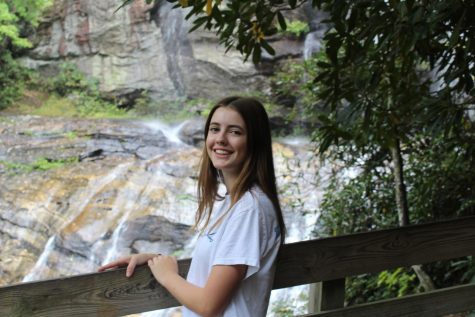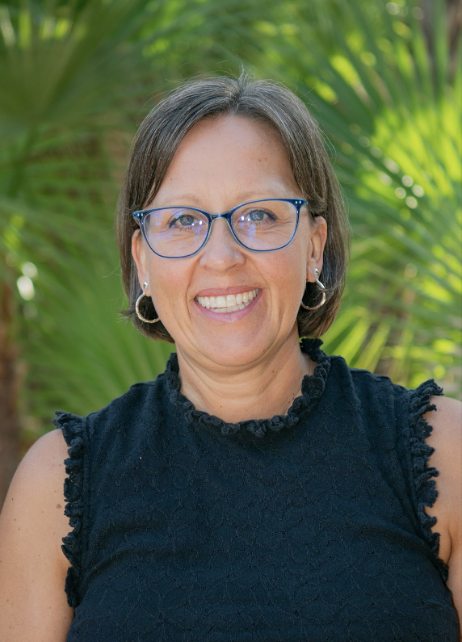Hallway Chronicles: Anuksha Wickramasinghe
Author and photographer Anuksha discusses her book dedicated to improving the lives of Sri Lankan orphan girls at Grace Girls’ Home.
May 3, 2018
Anuksha Wickramasinghe ’20 holds two things especially dear to her heart: her ancestral home of Sri Lanka and photography. When she was presented with the opportunity to combine these passions in order to positively impact orphan girls’ lives, she seized the moment and created a book that is now published overseas in Sri Lanka, with all profits directed to the Sri Lankan orphanage Grace Girls’ Home. In the light of her accomplishment, The Fanfare had the chance to interview Anuksha about her journey publishing a book, exploring Sri Lanka and interacting with the girls from Grace Girls’ Home.
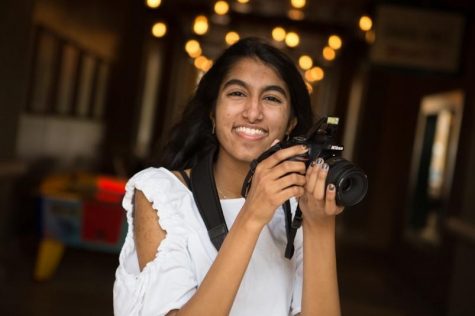
PASSIONATE PHOTOGRAPHER: Wickramasinghe first got her hands on a camera when she purchased a Sony Cyber Shot at eight years old.
Q. If you had to summarize your book that is composed of photography and writing, how would you describe it?
A. I think my book actually captures the essence of Sri Lanka through both visuals, like photographs that I took and my own narrations of the country, because a lot of the times, when people think of Sri Lanka, they think of it as a tourist destination or even about its civil war. People don’t really know it for the country that it’s for, like its beauty, and a lot of the hidden gems that are within the country. So I think my book, because I’ve traveled a lot through Sri Lanka, does a lot of capturing those things that most people miss; to really capture, show and present a different sense of the island that most people don’t get to see.
Q. What inspired you to write a book in the first place? Did you ever believe your work would become a success?
A. I’ve always been very attached to Sri Lanka and my heritage, because my parents are from there, and that’s always been a part of who I am: the food, the culture [and] the way I even look. Even my grandparents and everyone around me have fostered this love of Sri Lanka in my own culture, so that’s something that’s always amazed me. I’ve also loved photography [for] a long time, and I’ve really been fascinated by photography as a medium in a way to capture and tell stories. I think I really thought of the idea of creating a book when I first visited Grace Girls’ Home, which is a home which helps orphan and impoverished girls in Trincomalee, Sri Lanka, which was greatly affected by the war. So when I saw [the girls], I thought I really wanted to do something. It captured both my love of writing, telling stories and my love of photography (and photography as a way of telling stories). I thought a book would be a perfect way to be able to raise money for them and show different aspects of Sri Lanka that most people don’t get to see.
Q. How has your perspective been impacted by your travels to Sri Lanka?
A. I think it’s been impacted a lot, because the first time I visited Sri Lanka was when I was five. At the time, the war was still ending, so even then it was very different than the U.S. We usually stayed with relatives, so I didn’t really get to see a lot of the areas that had been affected, because we stayed within the capital. As I grew up more, my parents used to take me a lot more out into the country into areas that had been more affected, and I really got to see the difference in lives, and the way that people value things so much. These people deserve so much. In a lot of areas, especially for the girls at Grace Girls’ Home, they deserve opportunities, and it’s only because of the lottery of birth that they’re in that position. As people who have things, it’s good to be able to share with them, and be able to provide them with those opportunities that they deserve as well.
Q. The wildlife and terrain you encountered in Sri Lanka certainly differed from Tampa’s native environment. What was your favorite adventure you have had there?
A. One of my favorite adventures was visiting this park called Yala. Yala National Park is one of Sri Lanka’s biggest national parks and home to the most leopards, which are actually endangered and are very hard to spot, and Sri Lanka has the highest concentration of them. They call you very lucky if you see one. As we were driving by a road, a leopard crossed right in front of us, so that was incredible. The power and majesty of leopards just encaptured me and I almost forgot to take a photo. I was like, “Wow, that’s just so amazing”.
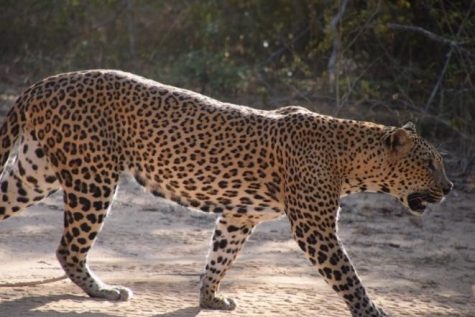
SPOTTED SIGHTING: While roaming Yala National Park, Wickramasinghe snapped a shot of a leopard, a rare sighting.
Q. In Sri Lanka, you volunteered at Grace Girls’ Home, the orphanage that receives all profits from your book. What can you tell me about your experience interacting with the girls there?
A. I’ve learned so much from the girls. I know people say sometimes that if you look them in the eyes you can never forget what you see, because they have such emotion in their eyes and you can see so much of their story and their background. Many of these girls have been through experiences that no one should have to face. They’ve slept in graveyards. They’ve seen their parents get killed by the tsunami and by civil war, because of the 2004 tsunami that impacted Sri Lanka. Yet these girls are so compassionate and loving and selfless, and you just want to give them the world and provide them with opportunities that they deserve, because they didn’t do anything wrong to be put in this position. That’s why I really want to help my own country, Sri Lanka, and to be able to help them have the opportunities that they deserve to achieve all the dreams that they want to dream.
Q. What was the process like publishing a book in a foreign country?
A. It was pretty interesting, because I wanted to publish it in Sri Lanka to give it back to the audience, and [I created it] to share it with people of my own heritage. I actually, what I did, was I first wrote the book in the U.S., and then after that I bought a lot of photography books within Sri Lanka. I’d find the copyright page and look at the publisher, and I’d email publishers and I’d call publishers. I got really lucky and then I was picked up there after countless emails. That took a couple months.
Q. How did you balance having a book distributed in a country across the world with your daily life?
A. It was a lot. I’d have to respond to emails because because there’s a nine-and-a-half or ten-and-a-half-time difference, depending on the daylight savings. I’d get emails really late. To try and be able to get things done on time and respond to things was pretty difficult. I think I learned how to manage it and to just to be able on top of everything I’m doing here, plus debate, as well as just learning to manage all of that. My parents were a great help, too.
Q. You obviously have a strong passion for literature and photography, as you composed this enthralling book and you plan to launch a project to institute a library at Grace Girls’ Home. How is this project developing?
A. I’m working on building a library and an English mentorship program for the girls. Right now, what we do is we skype the girls every weekend and we read books with them in English, because letting them learn English and helping them learn English provides a lot more opportunities for them in the future, like with careers. Also, just the gift of reading is amazing and it’s really great to be able to be bilingual and to be able to have so many more opportunities to love to read in multiple different languages and that sort of thing. It’s super important for careers, as I said earlier. So that’s what we’re starting to do, but we really want to expand it, so we’ve been working on purchasing books and building new areas for them to have a computer lab. [We want them to] have a library so they have a lot more books to read, and can really just expand their knowledge of English to really love reading for what it is.
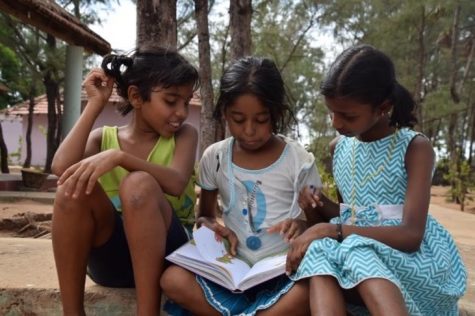
LEARNING ABOUT LITERATURE: Orphan girls from Grace Girls’ Home read in fascination from a book that will become a part of the new library installment at the orphanage.
Q. Your book will undoubtedly be one of your legacies at Berkeley, in the Tampa community and in Sri Lanka. What else do you hope to achieve or to leave behind as your mark on the world?
A. I just want to be able to help everybody around me and to try and be able to point out things that I see that are not necessarily wrong with the world, but that I think can be better and to be able to improve those things. I really hope I can inspire others as well, to be able to make change in the little ways that they can. [You don’t] have to be like the next Nelson Mandela, but just [share] kindness and compassion with other people through education and through what you see around you and everything that you can do in your power.
Q. What advice do you have for others aspiring to evoke change in a way as unique as yours?
A. It’s just a matter of looking at the world around you and seeing what you can make better, whether it just be people leaving trash on the ground, or even holding the door open for somebody, or seeing little things that are wrong with institutions, or just things that could be better, because at the end of the day you have the power to be able to make change. I think that’s something that we often forget because of how many things we have to do each day. It’s just being able to think, “Oh, I can make this better,” and really just going after it and making that change you want to see, to quote Gandhi.


